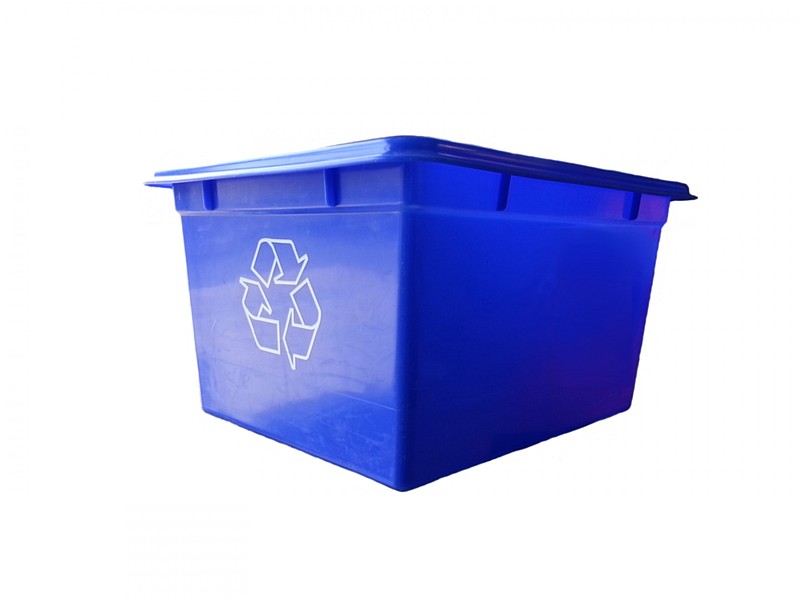ROGERS -- Residents will have higher trash collection rates and new recycling rules that could remove them from residential pickup services starting this month.
The City Council decided last month to approve an ordinance regarding trash and recycling within the city, effective Sunday.
The ordinance includes a 5.8% increase of trash and recycling collection rates, caused by increased expenses, according to Kevin Gardner of Lakeshore Recycling Systems, formerly Orion Waste Solutions. Costs related to fuel, vehicle parts, wages, insurance and benefits have all gone up, he said.
Pickup fees for a 96-gallon garbage cart and recycling are rising from $18.87 to $19.97 a month, according to the ordinance. The monthly fee for the 64-gallon cart is rising from $18.36 to $19.43.
Fees have increased several times over the last five years. At the beginning of 2019, the 96-gallon cart was $15.15 a month and the 64-gallon cart was $14.72.
An 18% rate increase in April 2019 was also attributed to increased expenses, including a new $55 per ton tipping fee charged by Mark Recycling, where Lakeshore takes the city's recyclables, and higher disposal fees at the landfill.
The recent 5.8% increase matches the All Urban Consumer Price Index for trash collection from October 2021 to October 2022 published by the U.S. Department of Labor.
RECYCLING PICKUP
The ordinance amending the city's contract with Lakeshore includes rules about several aspects of trash and recycling pickup.
One new policy suspends residents from the recycling pickup program after more than three observed contamination violations within a calendar year.
Drivers will tag contaminated recycling containers throughout the city. Eventually, the tags will have a QR code for a list of recyclable materials, Gardner said.
Many residents are putting trash bags of nonrecyclable materials in their recycling bins, according to Gardner. Once those materials are dumped in a truck of recyclable materials, the entire truckload can be contaminated, assessed at a recycling facility and then sent to the landfill.
Diverting a contaminated truckload to the landfill can cost cities an estimated $45 to $85 per ton, he said. The approved rate increase in Rogers does not factor in that additional cost, though Lakeshore will have to assess soon whether it is possible to continue subsidizing the cost of contamination, he said.
Suspension and removal of a customer's recycling container would last six months, according to the new policy.
If a resident continues the recycling program after six months and commits three more contamination violations within the following six months, the resident will be permanently removed from the program.
The city does not have the time nor desire to micromanage residents' recycling, but the issue has to be addressed, Mayor Greg Hines said.
Recycling costs factor in both the current market for recyclable materials as well as the expenses associated with addressing contamination, according to Gardner. While determining how much recyclable materials are worth might be outside of local control, contamination can be directly impacted by a city and its residents, he said.
The new measure in Rogers will primarily target situations where pickup crews observe trash bags sitting in open or overflowing recycling containers, Gardner said. Residents using recycling carts as secondary trash cans need to be educated about recycling and be kept from increasing the cost for the entire city when they don't follow the rules, he said.
Residents will not be fined for violating the policy, according to Gardner.
"We have to take immediate action or it is going to continue to bring recycling costs up," he said.
WISHCYCLING
City efforts to educate residents on the issue will continue, but have ultimately not prevented major contamination, Hines and Gardner said.
The city and Lakeshore have partnered with schools in educating children on how to be good recyclers and not "wishcyclers" -- people who put nonrecyclable materials in the recycling bin hoping it will be recycled. Hines said those efforts have had positive effects, but did not prevent spikes in contamination when people began staying home more often during the covid-19 pandemic.
Contamination rates in prior years hovered around 25% to 30% with slight increases year over year, according to Gardner. During the pandemic, contamination of recycling in Rogers rose as high as 47%, he said.
That number has been trending downward slowly, though more aggressive action is needed to address the issue, he said.
By addressing the most obvious contamination in residential carts, contamination is expected to decrease at least 15%, Gardner said. Lakeshore will try to evaluate the precise impact of the policy in the coming months, he said.
The contamination problem is a national one, according to Gardner. It is not confined to any specific neighborhood, side of town or demographic, though Lakeshore probably needs to do a better job of increasing Spanish language materials available to Rogers residents, he said.
Dan Holtmeyer is the recycling program manager for the Northwest Arkansas Council as well as a Rogers resident. Though the cities have different recycling systems, Rogers' new measures seem similar to how Fayetteville approaches recycling pickup, Holtmeyer said: If the cities don't want it, they will leave it.
"You can send out mass communications and mail out a pamphlet once a year, but it takes repeated outreach that responds to what someone does right or wrong," Holtmeyer said, adding he would like to see multilingual recycling resources for Hispanic and Marshallese communities in the area become more widely available.
"Recycling costs less if we do a good job of it. Being a bad recycler makes the cost of it go up," he said. "Everyone's trying new things. Everyone's trying whatever they can think of to help people understand recycling."

